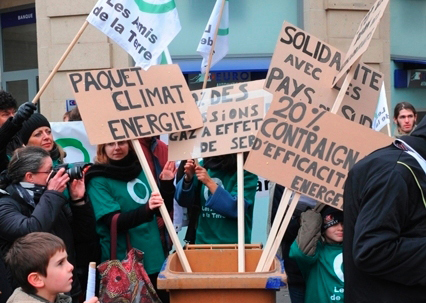Brussels, 18 January 2008 – Next week, the European Commission will propose a climate and energy package with draft laws to reduce greenhouse gas emissions. Environmental NGOs warn that parts of the package could be undermined by strong and unjustified behind-the-scenes pressure from European industry and industry-friendly European Commissioners.
CAN-Europe, Greenpeace, WWF and Friends of the Earth Europe believe that the proposals currently discussed within the Commission may be inadequate and inconsistent. Especially in light of the EU’s international political commitment at the Bali UN climate summit in December 2007 – to lead the fight against global climate change.
The most pressing concern is raised by the Commission’s overall EU climate target of a 20 per cent reduction in greenhouse gases from 1990 levels by 2020.
“The EU proposal is currently in violation of the Bali agreement for developed countries to reduce emissions by 25 – 40 per cent by 2020, a yardstick for staying below two degree global warming. If the European Union were to undermine this range, it would kick the legs out from under the international process. No one can expect the US, Japan or Canada to top a bad EU offer”, said Dr Stephan Singer, Head of the European Climate and Energy Unit at WWF.
“It appears that in the few days left before the adoption of the climate parts of the package, all sorts of industry sectors are making heart-wrenching pleas for special treatment. The Commission has to resist this pressure in the interest of creating a level playing field and protecting the climate, otherwise its package will fail,” said Mahi Sideridou, EU Climate Change and Energy Policy Director from Greenpeace.
“In order to be credible, the climate policy also needs to have a strong penalty system to ensure that companies and countries actually meet their targets,” said Sonja Meister, Climate and Energy Campaigner for Friends of the Earth Europe. “The current proposal does not ensure that emission cuts are in fact made in the EU, and will allow polluters to buy their way out through cheap credits from abroad. This will prevent investment and innovation in cleaner technology in Europe.”
NGO campaigners are also concerned by a lack of improvements on the EU Emissions Trading System (ETS), which caps the overall amount of climate pollution from industrial plants. The ETS had been under severe criticism for not delivering emission reductions and enabling power companies in particular to reap hefty profits. Attempts to improve the system are under attack from a range of industrial sectors, who want to ensure they can continue receiving CO2 allowances for free.
“If the EU keeps handing out free CO2 permits to big polluters, the whole instrument will fall flat on its face,” says CAN-Europe Director, Matthias Duwe. “This is the final opportunuity to rectify the errors in the EU ETS and if the proposals for next week are not significantly strengthened, misinformation from industry will have dealt a severe blow to EU climate policy, which will no longer be credible to European citizens and to other countries. “






